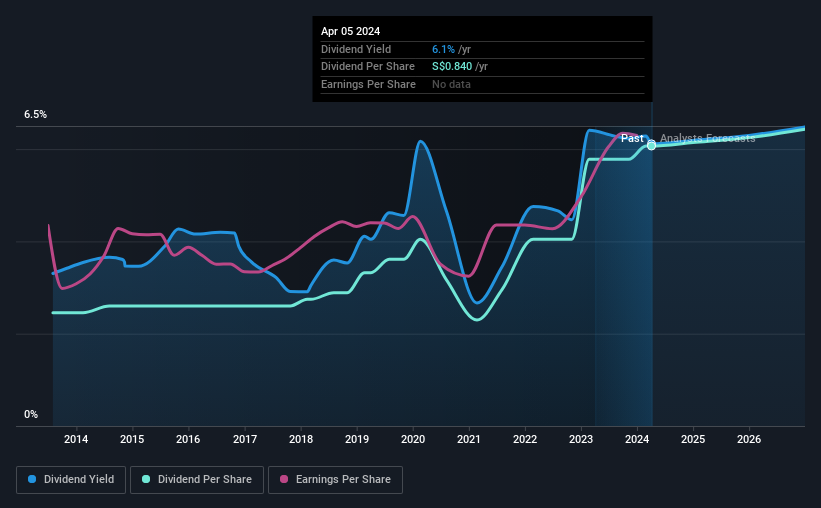Oversea-Chinese Banking (SGX:O39) Is Increasing Its Dividend To SGD0.42
Oversea-Chinese Banking Corporation Limited (SGX:O39) will increase its dividend from last year's comparable payment on the 21st of May to SGD0.42. This takes the dividend yield to 6.1%, which shareholders will be pleased with.
View our latest analysis for Oversea-Chinese Banking
Oversea-Chinese Banking's Payment Expected To Have Solid Earnings Coverage
While it is great to have a strong dividend yield, we should also consider whether the payment is sustainable.
Oversea-Chinese Banking has established itself as a dividend paying company with over 10 years history of distributing earnings to shareholders. Taking data from its last earnings report, calculating for the company's payout ratio shows 53%, which means that Oversea-Chinese Banking would be able to pay its last dividend without pressure on the balance sheet.
The next 3 years are set to see EPS grow by 5.3%. Analysts forecast the future payout ratio could be 54% over the same time horizon, which is a number we think the company can maintain.
Dividend Volatility
The company's dividend history has been marked by instability, with at least one cut in the last 10 years. Since 2014, the dividend has gone from SGD0.34 total annually to SGD0.84. This works out to be a compound annual growth rate (CAGR) of approximately 9.5% a year over that time. We have seen cuts in the past, so while the growth looks promising we would be a little bit cautious about its track record.
Oversea-Chinese Banking Could Grow Its Dividend
With a relatively unstable dividend, it's even more important to see if earnings per share is growing. Oversea-Chinese Banking has seen EPS rising for the last five years, at 8.0% per annum. Shareholders are getting plenty of the earnings returned to them, which combined with strong growth makes this quite appealing.
Our Thoughts On Oversea-Chinese Banking's Dividend
Overall, it's great to see the dividend being raised and that it is still in a sustainable range. The payout ratio looks good, but unfortunately the company's dividend track record isn't stellar. This looks like it could be a good dividend stock going forward, but we would note that the payout ratio has been at higher levels in the past so it could happen again.
Investors generally tend to favour companies with a consistent, stable dividend policy as opposed to those operating an irregular one. However, there are other things to consider for investors when analysing stock performance. For instance, we've picked out 1 warning sign for Oversea-Chinese Banking that investors should take into consideration. Is Oversea-Chinese Banking not quite the opportunity you were looking for? Why not check out our selection of top dividend stocks.
Have feedback on this article? Concerned about the content? Get in touch with us directly. Alternatively, email editorial-team (at) simplywallst.com.
This article by Simply Wall St is general in nature. We provide commentary based on historical data and analyst forecasts only using an unbiased methodology and our articles are not intended to be financial advice. It does not constitute a recommendation to buy or sell any stock, and does not take account of your objectives, or your financial situation. We aim to bring you long-term focused analysis driven by fundamental data. Note that our analysis may not factor in the latest price-sensitive company announcements or qualitative material. Simply Wall St has no position in any stocks mentioned.

 Yahoo Finance
Yahoo Finance 
